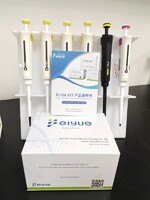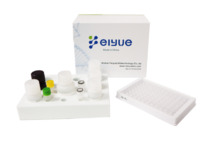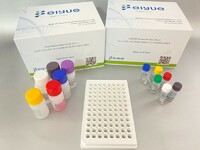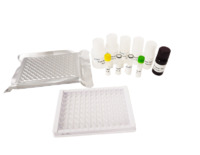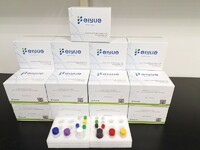Mouse Myotonin-Protein Kinase (DMPK) ELISA Kit
Specifications
Myotonin-Protein Kinase (DMPK) Introduction
Myotonin-protein kinase (MT-PK) also known as myotonic dystrophy protein kinase (MDPK) or dystrophia myotonica protein kinase (DMPK) is an enzyme that in humans is encoded by the DMPK gene. The dmpk gene product is a Ser/Thr protein kinase homologous to the MRCK p21-activated kinases and Rho kinase family. Data obtained by using antibodies that detect specific isoforms of DMPK indicate that the most abundant isoform of DMPK is an 80-kDa protein expressed almost exclusively in smooth, skeletal, and cardiac muscles.[9] This kinase exists both as a membrane-associated and as a soluble form in human left ventricular samples. The different C termini of DMPK that arise from alternative splicing determine its localization to the endoplasmic reticulum, mitochondria, or cytosol in transfected COS-1 cells. Among the substrates for DMPK proposed by in vitro studies are phospholemman, the dihydropyridine receptor, and the myosin phosphatase targeting subunit. However, an in vivo demonstration of the phosphorylation of these substrates by DMPK remains to be established, and a link between these substrates and the clinical manifestations of myotonic dystrophy (DM) is unclear. Myotonin-protein kinase is a serine-threonine kinase that is closely related to other kinases that interact with members of the Rho family of small GTPases. Substrates for this enzyme include myogenin, the beta-subunit of the L-type calcium channels, and phospholemman. Although the specific function of this protein is unknown, it appears to play an important role in muscle, heart, and brain cells. This protein may be involved in communication within cells. It also appears to regulate the production and function of important structures inside muscle cells by interacting with other proteins. For example, myotonic dystrophy protein kinase has been shown to turn off (inhibit) part of a muscle protein called myosin phosphatase. Myosin phosphatase is an enzyme that plays a role in muscle tensing (contraction) and relaxation.
Mouse Myotonin-Protein Kinase (DMPK) ELISA Kit Test method
This kit uses sandwich ELISA to detect the concentration of Myotonin-Protein Kinase (DMPK) The microtiter plate provided in this kit has been pre-coated with an antibody specific to Myotonin-Protein Kinase (DMPK). Standards or samples are then added to the appropriate microtiter plate wells with a biotin-conjugated antibody specific to Myotonin-Protein Kinase (DMPK). Next, Avidin conjugated to Horseradish Peroxidase (HRP) is added to each microplate well and incubated. After TMB substrate solution is added, only those wells that contain of DMPK, biotin-conjugated antibody and enzyme-conjugated Avidin will exhibit a change in color. The enzyme-substrate reaction is terminated by the addition of sulphuric acid solution and the color change is measured spectrophotometrically at a wavelength of 450nm ± 10nm. The concentration of Myotonin-Protein Kinase (DMPK) in the samples is then determined by comparing the OD of the samples to the standard curve.
Myotonin-protein kinase (MT-PK) also known as myotonic dystrophy protein kinase (MDPK) or dystrophia myotonica protein kinase (DMPK) is an enzyme that in humans is encoded by the DMPK gene. The dmpk gene product is a Ser/Thr protein kinase homologous to the MRCK p21-activated kinases and Rho kinase family. Data obtained by using antibodies that detect specific isoforms of DMPK indicate that the most abundant isoform of DMPK is an 80-kDa protein expressed almost exclusively in smooth, skeletal, and cardiac muscles.[9] This kinase exists both as a membrane-associated and as a soluble form in human left ventricular samples. The different C termini of DMPK that arise from alternative splicing determine its localization to the endoplasmic reticulum, mitochondria, or cytosol in transfected COS-1 cells. Among the substrates for DMPK proposed by in vitro studies are phospholemman, the dihydropyridine receptor, and the myosin phosphatase targeting subunit. However, an in vivo demonstration of the phosphorylation of these substrates by DMPK remains to be established, and a link between these substrates and the clinical manifestations of myotonic dystrophy (DM) is unclear. Myotonin-protein kinase is a serine-threonine kinase that is closely related to other kinases that interact with members of the Rho family of small GTPases. Substrates for this enzyme include myogenin, the beta-subunit of the L-type calcium channels, and phospholemman. Although the specific function of this protein is unknown, it appears to play an important role in muscle, heart, and brain cells. This protein may be involved in communication within cells. It also appears to regulate the production and function of important structures inside muscle cells by interacting with other proteins. For example, myotonic dystrophy protein kinase has been shown to turn off (inhibit) part of a muscle protein called myosin phosphatase. Myosin phosphatase is an enzyme that plays a role in muscle tensing (contraction) and relaxation.
Mouse Myotonin-Protein Kinase (DMPK) ELISA Kit Test method
This kit uses sandwich ELISA to detect the concentration of Myotonin-Protein Kinase (DMPK) The microtiter plate provided in this kit has been pre-coated with an antibody specific to Myotonin-Protein Kinase (DMPK). Standards or samples are then added to the appropriate microtiter plate wells with a biotin-conjugated antibody specific to Myotonin-Protein Kinase (DMPK). Next, Avidin conjugated to Horseradish Peroxidase (HRP) is added to each microplate well and incubated. After TMB substrate solution is added, only those wells that contain of DMPK, biotin-conjugated antibody and enzyme-conjugated Avidin will exhibit a change in color. The enzyme-substrate reaction is terminated by the addition of sulphuric acid solution and the color change is measured spectrophotometrically at a wavelength of 450nm ± 10nm. The concentration of Myotonin-Protein Kinase (DMPK) in the samples is then determined by comparing the OD of the samples to the standard curve.
- Contact: lottie Shi


